
Mid-Week Review
Under New Management — Russia Now Runs OPEC
At the December OPEC meeting in Vienna, Saudi Arabia was unable to convince OPEC members to agree to a deal on supply cuts on the first day of meetings. Some members felt the Kingdom should bear the brunt of the cuts since they had increased their production significantly from May to October. Other members, led by Iran, were looking for waivers from cuts due to special circumstances. No deal was made until Russia arrived and brokered a deal. Click here to read more from Bloomberg.
Loss of Libyan production does not affect oil prices
Libya’s state-owned National Oil Corporation (NOC) declared force majeure on operations at its biggest oilfield on December 17 amid a stand-off with armed protesters, expecting a loss of 315,000 barrels per day (bpd) for the OPEC member. Because crude output from the U.S. is so high, it has practically drowned out what would otherwise be a notable disruption in the oil market. “In terms of the impact on prices, at present it is struggling to overturn the prevailing bearish bias,” Stephen Brennock of PVM Oil Associates told CNBC. Click here to read more from CNBC.
New oil, gas projects to accelerate next year: report
The number of new oil and gas projects will rise five-fold next year from a 2015 trough but overall spending is still unlikely to be enough to meet future demand, consultancy Wood Mackenzie said in a report. Shaken by a sharp drop in oil prices in recent months, boards are generally expected to stick to spending discipline imposed following the 2014 price crash. Global investment in oil and gas production, known as upstream, is expected to reach around $425 billion next year, according to WoodMac analyst Angus Rodger. That compares with a total spending of $770 billion in 2014, which dropped to $400 billion in 2016 and 2017. Click here to read more from Reuters.
Coming changes in marine fuel sulfur limits will affect global oil markets
International regulations limiting sulfur in fuels for ocean-going vessels, set to take effect in January 2020, have implications for vessel operators, refiners, and global oil markets. Stakeholders will respond to these regulations in different ways, increasing uncertainty for crude oil and petroleum product price formation in both the short and long term. Vessel operators have several choices for compliance with the new IMO sulfur limits. One option is to switch to a lower-sulfur fuel compliant with the new IMO rules. However, the cost, widespread availability, and specifications of a new fuel for use in marine engines is still uncertain. Click here to read more from the EIA.
This article is part of Daily Market News & Insights
Tagged:
MARKET CONDITION REPORT - DISCLAIMER
The information contained herein is derived from sources believed to be reliable; however, this information is not guaranteed as to its accuracy or completeness. Furthermore, no responsibility is assumed for use of this material and no express or implied warranties or guarantees are made. This material and any view or comment expressed herein are provided for informational purposes only and should not be construed in any way as an inducement or recommendation to buy or sell products, commodity futures or options contracts.





